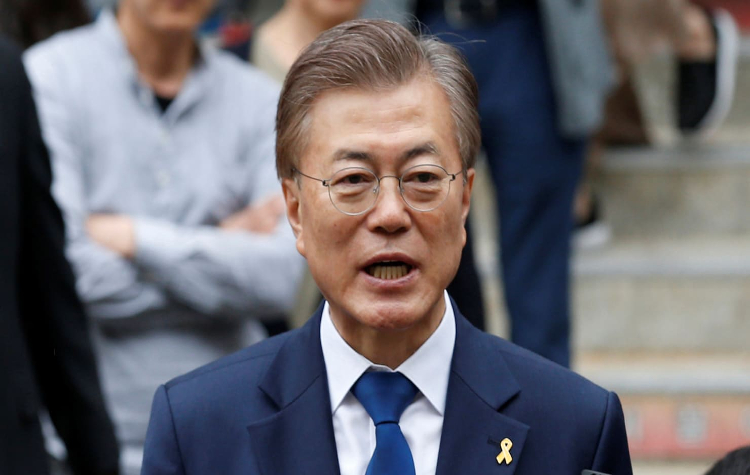(Bangkok, 10 May 2017) – As South Korea elected a new President yesterday, the Asian Forum for Human Rights and Development (FORUM-ASIA) calls on the new incoming President, Mr. Moon Jae-in, to conduct a thorough, impartial, and independent investigation into the death of Baek Nam-gi. A failure to do so would be a further discredit to the human rights track-record of the country.
On 25 September 2016, Baek passed away after having been in a coma for 317 days. This had been caused by him being shot by a police’s water cannon on 14 November 2015 during the People’s Rally 2015 in Seoul, while protesting against the former Government. Despite widespread condemnation of what occurred and a continuous call for an independent investigation into what happened, among others by Maina Kiai, the then UN Special Rapporteur on the rights to freedom of peaceful assembly and of association, the former Government never issued an apology, let alone initiating an investigation. By rectifying this failure, President Moon Jae-in has an opportunity to restore the image of South Korea as a country that promotes and protects human rights.
On 4-9 December 2015, FORUM-ASIA led a mission to Seoul to look into any breaches of law by authorities during the People’s Rally 2015 on 14 November 2015 and the Nationwide Rally for the Denunciation of State Violence and the Recovery of Baek Nam-gi on 5 December 2015. The delegation met with civil society organisations, journalists, lawyers, victims, a member of the National Assembly, and the National Human Rights Commission of Korea (NHRCK).[1] The Mission concluded there was reason to fault authorities for human rights violations in the form of: the use of water cannon; the set-up of a bus barricade; and reprisals against assembly organisers and participants. The Mission also noted that there was indiscriminate and unjustified use of water cannon against protesters, which resulted in the injuring and eventual passing of Baek.
After his death, the police attempted to conduct an autopsy of Baek, against the explicit will of his family.[2] The Seoul National University Hospital was guarded by supporters and civil society groups for 40 days to prevent the police from taking his body. On 18 November 2016, the People’s Committee for Farmer Baek Nam-gi and Condemning State Violence and his family filed a complaint against seven alleged perpetrators, including the former National Police Agency Commissioner General, Kang Sin-myung and the former Seoul Metropolitan Police Agency Chief, Goo Eun-su. Again, there was no response from the Government.
‘The excessive use of force by authorities must be investigated promptly and independently. The failure to even apologise and lack of any steps taken to initiate an investigation into the death of Baek Nam-gi, is an embarrassment for a country like South Korea that claims to uphold, promote, and protect human rights. The President Moon Jae-in needs to address this immediately to eliminate the impression that impunity is gaining ground in South Korea’, says John Samuel, Executive Director of FORUM-ASIA.
The indiscriminate and unjustified use of water cannon against protesters on 14 November 2015 by the authorities is a violation of both domestic and international human rights standards. Article 13 of the Presidential Decree on Standards of the Usage of Lethal Force Equipment and Section Two of the Operational Instruction on Water Cannons states that a water cannon is only allowed to be used below the chest, and that when protesters are injured the police should immediately provide emergency aid. According to international human rights standards, authorities should ‘use force only when necessary and to the extent required for the performance of their duty’[3], and ‘should not resort to force during peaceful assemblies and ensure that where force is absolutely necessary, no one is subject to excessive or indiscriminate use of force’.[4]
FORUM-ASIA urges President Moon Jae-in to immediately rectify the failure of the former Government to handle what happened to Baek with respect and in accordance with national and international human rights standards. President Moon Jae-in will have an opportunity to set the tone for his Presidency on how his new Government will deal with human rights issues. Issuing a formal apology to the family and loved-ones of Baek, conducting a thorough, impartial and independent investigation, and bringing those responsible to justice, would be a great place to start.
***
For a PDF version of this statement in English, click here.
For a PDF version of this statement in Korean, click here.
***
[1] https://forum-asia.org/?p=19791
[2] https://forum-asia.org/?p=21605
[3] Basic Principles on the Use of Force and Firearms by Law Enforcement Officials, adopted by the Eighth United Nations Congress on the Prevention of Crime and the Treatment of Offenders, Havana, Cuba, 27 August to 7 September 1990.
[4] The resolution adopted by Human Rights Council, 11 April 2014 (A/HRC/RES/25/38), http://www.ohchr.org/Documents/Issues/Executions/A-HRC-RES-25-38.pdf




